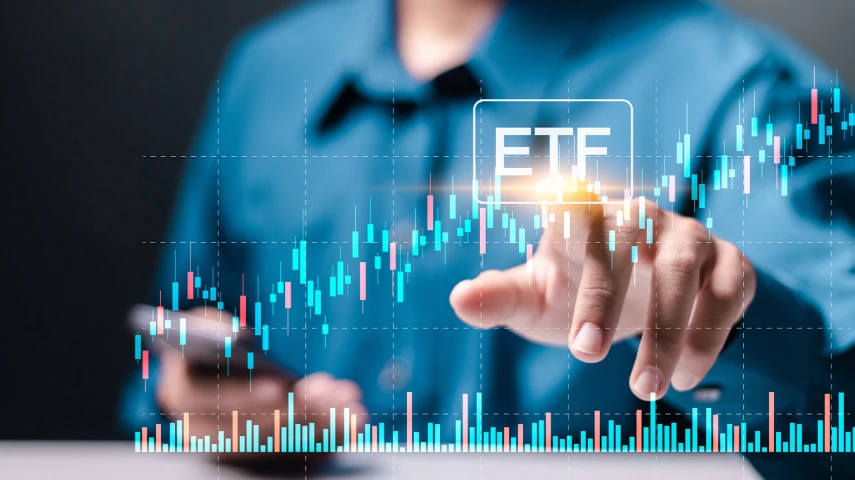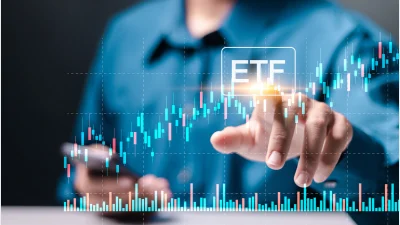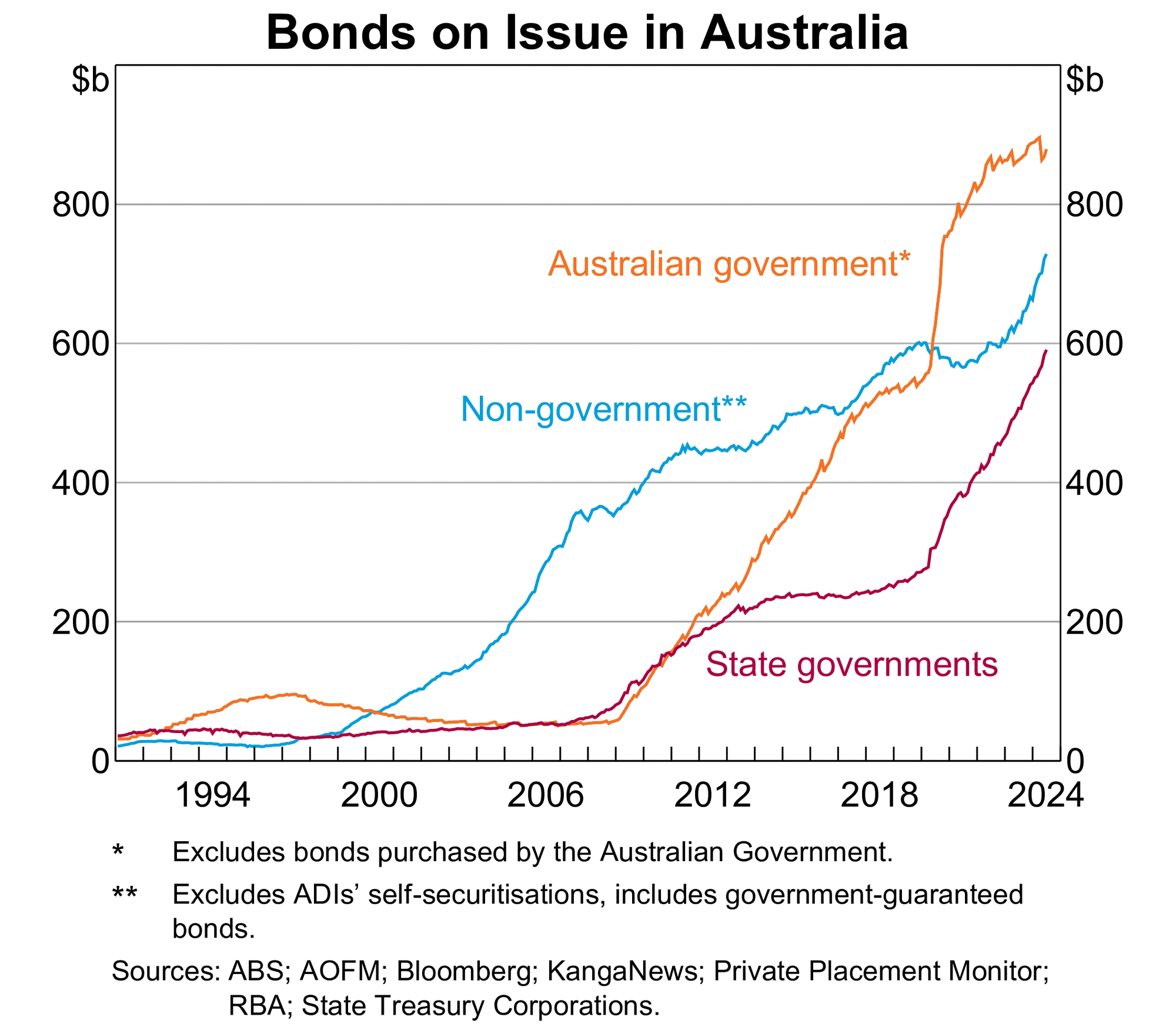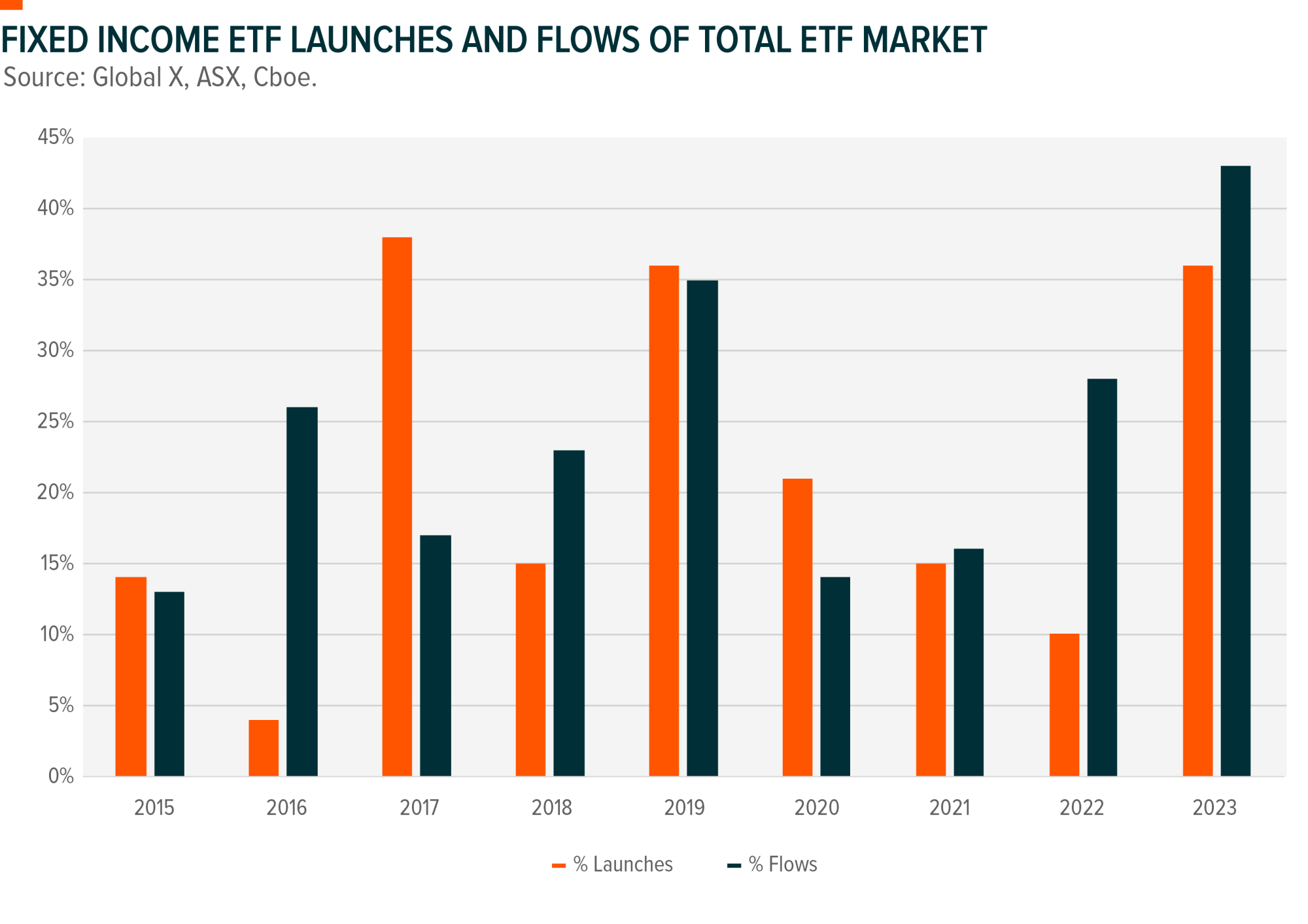How Bond ETFs Are Changing the Game



Australian investors have faced turbulent economic conditions in recent years. However, there is good news for those who want to alleviate some of this financial pressure.
As global central banks raised interest rates at one of the fastest paces on record in 2022 and 2023, volatility has rippled across share and bond markets. Paired with a cost-of-living crisis and Australia’s ongoing battle against inflation, investors are seeking relief.
On the plus side, these higher interest rates have put the “income” back in fixed income and investors can now achieve reasonable yields from fixed income securities without taking on the higher volatility exhibited in other asset classes like stocks.
The growing proliferation of fixed income ETFs has enabled access for investors to diversify their portfolios to access securities that were once cumbersome and costly to obtain. Continued innovation in ETFs is set to transform the investment landscape and change the game for investors, offering tools for income generation, defensive strategies, and enhanced portfolio diversification.
The Evolution of Fixed Income in Australia
Prior to the 1980’s, government-owned enterprises were the largest issuers in the bond market with the total market relatively infant and small. Moreover, during the first half of the 20th century, most companies financed their operations internally or through the share market. Government bond issuance did spike during World War 1 following the Australia’s government “war bond” issuance.
Since the 1980’s there has been strong development in the bond market driven by deregulation and privatisation, with a wide range of entities issuing AUD-denominated bonds, predominately from the Australian banks. The Australian bond market is now worth over $2 trillion dollars and continues to grow in size.

The Australian bond market was heavily oriented towards a local investor base but has seen an increasing appetite from global investors and different investor types such as banks, financial intermediaries, super funds, central banks and everyday investors.
Interestingly, Australian investors have one of the lowest allocations to fixed income (i.e. bonds) compared to globally developed peers, hovering around 14% which has been unchanged since 2013.

Most of the allocation has been to traditional forms of fixed income like cash and term deposits. Cash and term deposits can play an important part in client portfolios, but while term deposits may lock-in rates, they may lock out opportunities of other types of fixed income investments.
ETF Market
ETFs have democratised fixed income investing by making it easier, more liquid, and cheaper. Traditionally, fixed income investing required purchasing large minimum lot sizes, typically only accessible to large banks and institutions trading over-the-counter (OTC). ETFs eliminate these barriers, allowing individual investors to buy and sell fixed income securities conveniently on the share market.
Fixed income ETFs can provide investors with income and portfolio diversification, all whilst having daily liquidity. While they have only been offered to Australian investors since 2012, they are growing at a ten-year compound annual growth rate of 40% p.a. Currently valued at approximately $28 billion, fixed income ETFs now constitute 14% of the total Australian ETF market, a substantial increase from the 7% market share they held ten years ago.

Notably, in 2023, the inflows into fixed income ETFs were on par with those into equity ETFs for the first time. An impressive $6.5 billion was invested into fixed income ETFs in 2023, representing 43% of the total market flows, the highest proportional level recorded.

Moreover, there has been an increasing number of fixed-income managed funds experiencing outflows, underscoring the structural shift from high-cost to low-cost investing in more transparent and tax-efficient structures like ETFs. While the vast majority of fixed-income ETFs have enjoyed positive net flows so far in 2024, over 50% of actively managed fixed-income managed funds have seen investors pull their money out.
The Next Wave Of Innovation
The fixed income component of the Australian ETF market has seen increasing product availability (now over 70 products available) with new innovative solutions being launched to help cater for Australian investor needs.
The Australian fixed income ETF market has grown significantly since the first Australian government, semi-government, and inflation bond ETFs were introduced in 2012. Corporate bond ETFs were the second innovation of fixed income ETFs and grew in market share with product innovation coming since 2015. Additionally, floating rate notes and hybrid securities have gained popularity since their introduction in 2017, with floating rate notes like subordinated bonds seeing close to $800 million of net flows in 2023.
Initially, only ETFs that provided exposure to Australian fixed income securities were available until 2015, when ETFs for global developed and emerging market bonds were launched. In 2022, Global X began offering more specific fixed income exposures, such as US fixed income, through the US Treasury Bond ETF (Currency Hedged) (USTB) and Global X USD High Yield Bond ETF (Currency Hedged) (USHY), allowing for more granular exposure in client portfolios.
There has also been an increasing number of active fixed income managers launching their strategies as an active ETF, but they still only account for 8% of the total fixed income market, down from 12% in early 2022 due to some outflows and other areas of the market receiving the majority of investor dollars.

The next wave of fixed income innovation may see existing fixed income strategies being packaged up into one tradable security targeting a particular sector to make portfolio allocation easier and simpler. For example, the recently launched Global X Australian Bank Credit ETF (BANK) provides a first-to-market diversified solution enabling investors to combine three different fixed income security types (senior bonds, subordinated bonds and hybrid securities) dedicated to Australian banks across the capital stack into one cost-effective index-based product listed on the share market.
There will continue to be a push in product innovation by ETF issuers to offer more solutions catering to investor needs. With passive income and portfolio protection being common goals for Australian investors, ETFs can help investors access the fixed income asset class through a more liquid, low-cost, and tax-efficient means. What once was considered a boring asset class is now front of mind for Australian investors amid market uncertainty and interest rate pathway deviations. ETFs are changing the fixed income game, making sophisticated investment strategies more accessible, and empowering investors to have greater choice in adding defensive exposure and income enhancements in their portfolios.
Learn more about fixed income and fixed income ETFs with Global X here.
Disclaimer
This document is issued by Global X Management (AUS) Limited (“Global X”) (Australian Financial Services Licence Number 466778, ACN 150 433 828) and Global X is solely responsible for its issue. This document may not be reproduced, distributed or published by any recipient for any purpose. Under no circumstances is this document to be used or considered as an offer to sell, or a solicitation of an offer to buy, any securities, investments or other financial instruments. Offers of interests in any retail product will only be made in, or accompanied by, a Product Disclosure Statement (PDS) which is available at www.globalxetfs.com.au. In respect of each retail product, Global X has prepared a target market determination (TMD) which describes the type of customers who the relevant retail product is likely to be appropriate for. The TMD also specifies distribution conditions and restrictions that will help ensure the relevant product is likely to reach customers in the target market. Each TMD is available at www.globalxetfs.com.au.
The information provided in this document is general in nature only and does not take into account your personal objectives, financial situations or needs. Before acting on any information in this document, you should consider the appropriateness of the information having regard to your objectives, financial situation or needs and consider seeking independent financial, legal, tax and other relevant advice having regard to your particular circumstances. Any investment decision should only be made after obtaining and considering the relevant PDS and TMD.
This document has been prepared by Global X from sources which Global X believes to be correct. However, none of Global X, the group of companies which Mirae Asset Global Investments Co., Ltd is the parent or their related entities, nor any of their respective directors, employees or agents make any representation or warranty as to, or assume any responsibility for the accuracy or completeness of, or any errors or omissions in, any information or statement of opinion contained in this document or in any accompanying, previous or subsequent material or presentation. To the maximum extent permitted by law, Global X and each of those persons disclaim all any responsibility or liability for any loss or damage which may be suffered by any person relying upon any information contained in, or any omissions from, this document.
Investments in any product issued by Global X are subject to investment risk, including possible delays in repayment and loss of income and principal invested. None of Global X, the group of companies of which Mirae Asset Global Investments Co., Ltd is the parent, or their related entities, nor any respective directors, employees or agents guarantees the performance of any products issued by Global X or the repayment of capital or any particular rate of return therefrom.
The value or return of an investment will fluctuate and an investor may lose some or all of their investment. All fees and costs are inclusive of GST and net of any applicable input tax credits and reduced input tax credits, and are shown without any other adjustment in relation to any tax deduction available to Global X. Past performance is not a reliable indicator of future performance.

Global X is a leading ETF provider, offering a wide range of thematic, commodities, income, core, and digital asset solu...
Recommended for you
One of the most significant surprises of 2024 was the plan announced by the Australian Prudential Regulation Authority’s (APRA) to phase out AT1 hybrids issued by banks. This change raises a number of questions, the most pressing of which is what will happen to AT1 hybrids in 2025 and 2026? Fixed income investors would be wise to start planning how best to navigate the road ahead.
The recent US election has had strong reverberations across equity markets internationally and in Australia. Here, Tynda...
The growing use of drones is transforming warfare
Innovation isn’t just a buzzword; it’s the lifeblood of growth, competitiveness, and sustainability across industries.

















